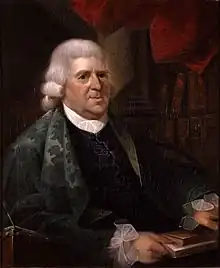Samuel Dexter | |
|---|---|
 | |
| Member of the Massachusetts House of Representatives | |
| In office 1764–1767, 1775, 1785 | |
| Member of the Massachusetts Governor's Council | |
| In office 1768–1774 | |
| Personal details | |
| Born | 1726 Dedham, Massachusetts Bay |
| Died | 1810 (aged 83–84) Woodstock, Connecticut, U.S. |
| Children | Samuel Dexter |
| Parent | Samuel Dexter (father) |
Samuel Dexter (1726—1810[1][2]) was an early American politician from Dedham, Massachusetts.
Personal life
Born in 1726 in Dedham,[2] he did not wish to follow his father, also named Samuel Dexter, into the ministry at First Church and Parish in Dedham.[3][4] He married Hannah Sigourney in 1748.[2] His son, the third Samuel Dexter, served in the administrations of John Adams and Thomas Jefferson.
Career
Dexter moved from Dedham to Boston and earned "a modest fortune" with his "mercantile pursuits."[3][5] He retired back to Dedham in 1761 at the age of 36 to build the Samuel Dexter House.[3][4] The house still stands today at 699 High Street.[6]
Political career
After retiring to Dedham, he was active in the community for the next 13 years. He was active politically during the Revolutionary War[7] and kept a diary of his thoughts about the day's events.[8] During this time he served in the Massachusetts Provincial Congress.[3] He served in the Massachusetts House of Representatives from 1764 to 1767 and again in 1765, and 1785.[2][5][3] From 1768 to 1774, he was a Governor's Councillor.[9][3] He was a selectman for five terms beginning in 1764,[10][5] moderator,[5] justice of the peace, and town clerk in 1761.[2][5] He was town clerk for a total of five years.[11]
Following the evacuation of Boston, General George Washington spent the night of April 4, 1776 at Dexter's home on his way to New York.[12] In December 1771, Dexter hosted John Hancock and Jason Haven, his minister and brother-in-law, for dinner.[9] In July 1771, he invited Governor Thomas Hutchinson and several members of the Council[lower-alpha 1] to dinner.[9]
On the morning of April 19, 1775, a messenger came "down the Needham road" with news about the battle in Lexington.[13][14] He stopped at the home of Samuel Dexter and ran up to the front door.[14] Dexter met him at the front door and, upon hearing the news, nearly fainted.[14] He had to be helped back into his house.[14]
Dexter believed that it was suicidal for a group of militiamen to face off against the British Army.[14] Instead, he favored having them retreat to the interior to train before facing off against the redcoats.[15] He was accused of not being sufficiently devoted to the patriot cause but was too proud to fight back.[14]
He resigned all his positions in the autumn of 1775[lower-alpha 2] in ill health and moved to Woodstock, Connecticut.[3] In his will he left $170 to the Dedham Public Schools.[1]
Notes
- ↑ Possibly James Otis, Artemas Ward, or James Bowdoin.[9]
- ↑ Smith has the date as 1776.[3]
References
- 1 2 Smith 1936, p. 119.
- 1 2 3 4 5 Schutz, John A. (1997). Legislators of the Massachusetts General Court, 1691-1780: A Biographical Dictionary. UPNE. p. 206. ISBN 978-1-55553-304-5. Retrieved 8 November 2019.
- 1 2 3 4 5 6 7 8 Smith 1936, p. 75.
- 1 2 Hanson 1976, p. 133.
- 1 2 3 4 5 Hanson 1976, p. 134.
- ↑ Robert Hanson (1999). "Stories Behind the Pictures in the Images of America: Dedham Book". Dedham Historical Society News-Letter (December). Archived from the original on December 31, 2006.
- ↑ "A Capsule History of Dedham". Dedham Historical Society. 2006. Archived from the original on October 6, 2006. Retrieved November 10, 2006.
- ↑ Lockridge 1985, p. 112.
- 1 2 3 4 Hanson 1976, p. 147.
- ↑ Worthington 1827, p. 79-81.
- ↑ Worthington 1827, p. 79.
- ↑ Guide Book To New England Travel. 1919.
- ↑ Abbott 1903, pp. 290–297.
- 1 2 3 4 5 6 Hanson 1976, p. 152.
- ↑ Hanson 1976, p. 153.
Works cited
- Abbott, Katharine M. (1903). Old Paths And Legends Of New England (PDF). New York: The Knickerbocker Press. pp. 290–297. Retrieved October 6, 2018.
- Lockridge, Kenneth (1985). A New England Town. New York: W.W. Norton & Company. ISBN 978-0-393-95459-3.
- Smith, Frank (1936). A History of Dedham, Massachusetts. Transcript Press, Incorporated. Retrieved July 18, 2019.
- Worthington, Erastus (1827). The history of Dedham: from the beginning of its settlement, in September 1635, to May 1827. Dutton and Wentworth. p. 29. Retrieved November 8, 2019.
- Hanson, Robert Brand (1976). Dedham, Massachusetts, 1635-1890. Dedham Historical Society.